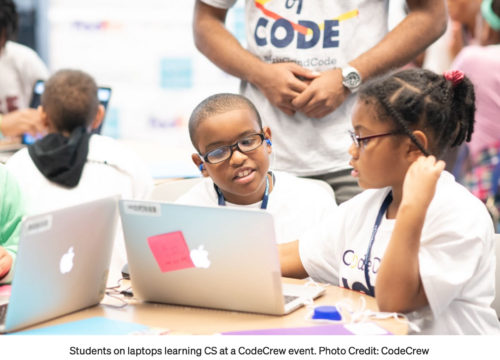
Connecting K-5 Students to Integrated Computer Science
Posted
We recently partnered with Code.org to conduct a national study that focuses on how K-5 teachers integrated computer science (CS) into their curriculum. Why? Well, Code.org is working on a new and unique CS curriculum called Computer Science Connections. The goal of their curriculum is to teach computing by making critical connections between learning CS […]
Continue Reading
Computer Science Teachers’ Problems of Practice: Solve This!
Posted
In 2021 we received funding from a ACM SIGCSE Special Projects Grant, with our colleague Dr. Michelle Friend (University of Nebraska – Omaha) for a project we called: Solve this! Problems of practice teachers face in K-12 CS Education. Since then we have been working on gathering, analyzing, and disseminating the findings. Overall, our goal […]
Continue Reading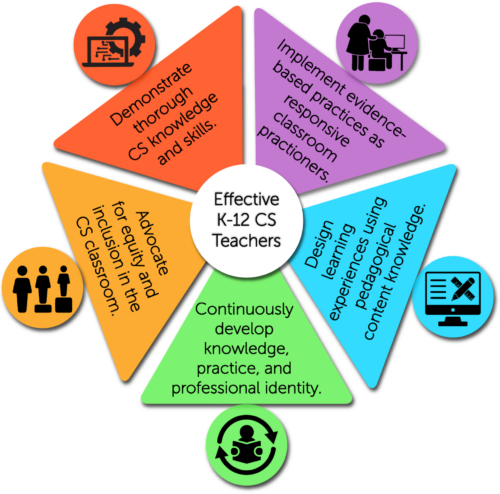
CS Teachers’ Reflection on the CSTA K-12 Teacher Standards
Posted
This past summer, IACE had the opportunity to partner with the Computer Science Teachers Association (CSTA) and CREATE, a research center at the University of California, San Diego, to develop an assessment of teachers’ understanding and use of the CSTA K-12 CS Teacher Standards. As part of this process, we wanted to understand how the […]
Continue Reading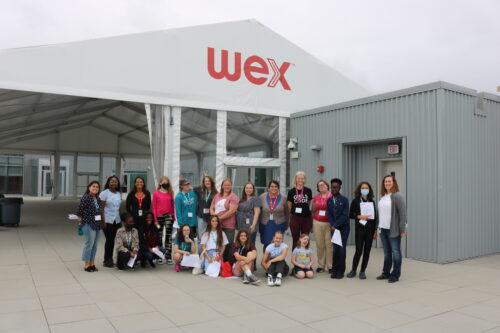
Educate Maine: Decreasing Financial Barriers and Increasing Access to Coding
Posted
At IACE we find great value in raising up the voices of our partners who are doing great things in the computer science community. One of those partners is Educate Maine. This summer Educate Maine’s signature project, Project>Login, hosted 5 Girls Who Code camps all over the state of Maine. They were able to […]
Continue Reading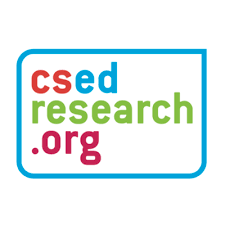
K-12 Computer Science Teachers Problems of Practice
Posted
Recently, K-12 teachers in Indiana spoke to us during #CSTAPDWeekIN (CSTA PD Week in Indiana) about problems of practice that they have experienced or witnessed during their time teaching CS. We highlight here a few of their thoughts. —- K-12 CS teachers from Indiana recently shared problems of practice with us that they have witnessed […]
Continue Reading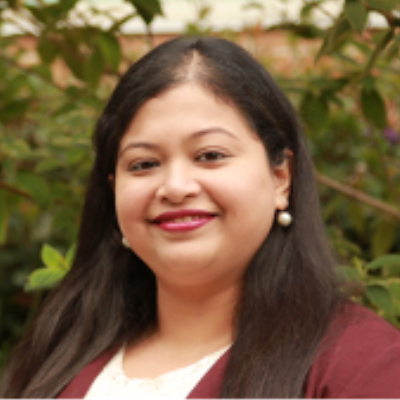
A Conversation with Dr. Satabdi Basu
Posted
This post features Dr. Satabdi Basu, a Senior Education Researcher at SRI International, an independent, nonprofit research institute. Dr. Basu joined SRI International in 2016 after receiving her Ph.D. from Vanderbilt University in Computer Science (CS) with a specialization in AI for Education. At SRI, she leads projects in K-12 CS and AI education that […]
Continue Reading
Meet Kristina Holsapple, an Undergraduate Computer Science Major
Posted
This post features Kristina Holsapple. Kristina is third-year undergraduate student studying Computer Science at the University of Delaware. Kristina Holsapple (she/they) is in their third year studying Computer Science at University of Delaware (UD) where they work with Dr. Cory Bart. They graduated from a high school where, unfortunately, there were no CS courses offered. […]
Continue Reading
Block-based Programming in Computer Science Classrooms
Posted
This week’s post features David Weintrop and his research on block-based programming. He shares three key points his research has discovered so far. The first time I saw Scratch, I thought, “Wow! How clever! Is this the end of missing semi-colons errors!?” It was clear to me how the shape of the blocks, their easily […]
Continue Reading
Longitudinal Trends in K-12 Computer Science Education Research
Posted
In this post, Bishakha Upadhyaya provides highlights of our SIGCSE 2020 paper on trends in K-12 CS Education research (co-authored with Monica McGill and Adrienne Decker). For more details, watch her talk or read the paper. Research in the field of Computer Science education is growing and so is the data and results obtained […]
Continue Reading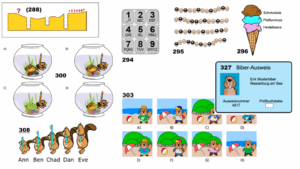
How to Attract the Girls: Gender-specific Performance and Motivation to learn Computer Science
Posted
In this blog post, Peter Hubwieser summarizes his work (with co-authors Elena Hubwieser and Dorothea Graswald) that was published in a 2016 journal article. Here, he highlights research exploring the importance of reaching girls earlier through motivation. The attempt to engage more women in Computer Science (CS) has turned out to be a substantial challenge […]
Continue Reading